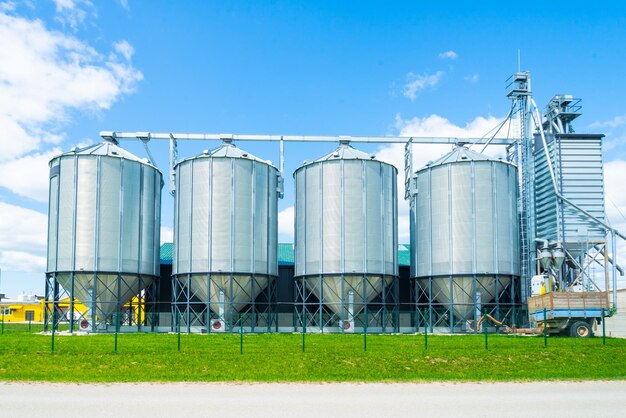Properly storing your harvest is crucial for maintaining its quality, minimizing losses, and ensuring you get the best return on your investment. As agricultural practices modernize, so do storage methods, providing farmers with advanced solutions to safeguard their produce. This article explores how modern storage solutions can help South African farmers store their harvest effectively.
The Importance of Proper Harvest Storage
Post-harvest losses in South Africa can account for 20-30% of total yield, primarily due to improper storage. Without effective storage, crops are vulnerable to:
- Pests and rodents, which can destroy significant portions of your harvest.
- Moisture and humidity, which lead to mold and spoilage.
- Temperature fluctuations, which degrade quality and reduce shelf life.
- Contamination, including exposure to chemicals or toxins.
Modern storage solutions not only combat these challenges but also enable farmers to sell their produce when prices are more favorable.
Modern Storage Solutions for Harvested Crops
1. Hermetic Storage Bags
Hermetic storage bags are airtight containers that prevent oxygen exchange, inhibiting the growth of pests and microorganisms.
- How They Work: The airtight environment creates low oxygen levels, suffocating insects and preventing fungal growth.
- Best For: Grains, legumes, and seeds.
- Advantages: Affordable, reusable, and effective in humid climates.
2. Metal Silos
Metal silos are durable, rodent-proof containers that protect grains and seeds.
- How They Work: These silos maintain a controlled environment, preventing moisture entry and pest infestation.
- Best For: Large-scale grain storage.
- Advantages: Long-lasting, scalable, and weather-resistant.
3. Cold Storage Units
Cold storage is ideal for perishable crops like fruits, vegetables, and dairy.
- How They Work: Refrigeration slows down the metabolic processes of produce, extending shelf life.
- Best For: Highly perishable items like berries, tomatoes, and leafy greens.
- Advantages: Maintains freshness, reduces spoilage, and improves market value.
4. Controlled Atmosphere (CA) Storage
CA storage is a high-tech solution where oxygen, carbon dioxide, and nitrogen levels are adjusted to extend the life of fresh produce.
- How It Works: By controlling gas levels and temperature, the respiration rate of fruits and vegetables is reduced.
- Best For: Apples, avocados, bananas, and other high-value crops.
- Advantages: Long-term storage without compromising quality.
5. Warehouse Receipt Systems (WRS)
This system combines modern storage facilities with financial support. Farmers store their produce in certified warehouses and receive a receipt they can use as collateral for loans.
- How It Works: Produce is safely stored in climate-controlled warehouses, and farmers can sell it later when market prices improve.
- Best For: Farmers with surplus harvests.
- Advantages: Reduces storage risks and provides financial flexibility.
6. Solar-Powered Dryers
For crops like grains, spices, or herbs that need drying, solar-powered dryers offer an efficient solution.
- How They Work: These dryers use solar energy to reduce moisture content, preventing spoilage.
- Best For: Coffee, tea, grains, and herbs.
- Advantages: Eco-friendly, cost-effective, and ideal for areas with abundant sunlight.
Best Practices for Using Modern Storage Solutions
- Sort and Clean Your Produce
Before storage, remove damaged, rotten, or immature produce to prevent contamination. Clean grains, fruits, and vegetables to remove dirt and pests. - Monitor Moisture Levels
Moisture is a leading cause of spoilage. Use moisture meters to ensure crops are adequately dried before storage. For example, grains should have a moisture content of 12-14%. - Ensure Proper Ventilation
For bulk storage, maintain airflow to reduce heat buildup and prevent mold growth. Use ventilation systems or fans for larger storage units. - Inspect Storage Units Regularly
Check for signs of pest infestations, structural damage, or moisture leakage. Hermetic bags and silos should remain sealed until needed. - Maintain Optimal Temperatures
For cold or CA storage, regularly monitor temperatures and humidity levels to prevent produce from freezing or drying out.
Benefits of Modern Storage Solutions
- Minimized Post-Harvest Losses: Advanced solutions protect crops from pests, moisture, and contamination.
- Improved Profit Margins: Farmers can sell produce during peak market conditions rather than immediately after harvest.
- Longer Shelf Life: High-value crops like avocados, apples, and grains remain fresh for extended periods.
- Sustainability: Solar-powered dryers and hermetic bags provide eco-friendly options for farmers.
Modern storage solutions offer South African farmers the tools they need to preserve their harvests, improve profitability, and contribute to national food security. By investing in technologies like hermetic bags, metal silos, or cold storage, farmers can reduce losses and maximize the value of their crops.
Join 'Farmers Mag' WhatsApp Channel
Get the latest Farming news and tips delivered straight to your WhatsApp
CLICK HERE TO JOIN






